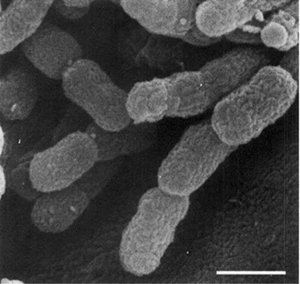Carnimonas nigrificans: Difference between revisions
No edit summary |
|||
| (27 intermediate revisions by the same user not shown) | |||
| Line 1: | Line 1: | ||
Title: Carnimonas nigrificans | Title: Carnimonas nigrificans | ||
Bacteria commonly known for black spots on cured meats | Bacteria commonly known for black spots on cured meats | ||
Classification: | |||
Species | {{Uncurated}} | ||
Description | [[Image:ijs-48-3-677-f1.gif|thumb|300px|right|Legend. Image credit: https://www.microbiologyresearch.org/content/journal/ijsem/10.1099/00207713-48-3-677?crawler=true.]] | ||
Genome | |||
Cell | ==Classification== | ||
Domain; Bacteria Phylum; Pseudomonadota Class; Gammaproteobacteria Order; Oceanospirillales family; Halomonadaceae Genus: Carnimonas species; nigrificans | |||
===Species=== | |||
<I>Carnimonas nigrificans</i>. | |||
==Description and Significance== | |||
<I>C. nigrificans</I> gets to a size of approximately. Optimal growth temperature is between 28-30 degrees C. <I>C. nigrificans</I> can grow in up to 8% sodium chloride. <I>C. nigrificans</I> usually grows to 0.5µm-0.6µm width, and up to 7µm length. <I>C. nigrificans</I> most commonly is seen growing on cured meat products. <I>C. nigrificans</I> is a non-spore forming bacteria. | |||
==Genome Structure== | |||
Carnimonas nigrificans has 2,390 total genes and 225 genetic pathways. C. nigrificans has 1,180 enzymatic reactions and 77 transport reactions. C. nigrificans has 2,312 polypeptide genes, 39 protein complexes, 798 enzymes, 277 transporters, 895 compounds, 1,744 transcriptional units, 50 tRNAs, and 4 GO terms. C. nigrificans has circular chromosomes. | |||
==Cell Structure, Metabolism and Life Cycle== | |||
Carnimonas nigrificans is a Gram-negative and catalase-positive and oxidase positive bacteria. C. nigrificans is an obligate aerobic organism, and is rod shaped. | |||
The G+C content of DNA of strain CTCBS1T of <I>C. nigrificans</i>is 56.0 +/- 0.3 mol%. <I>C. nigrificans</I> relies on glucose for energy, and does not produce gas from metabolization of glucose. <I>C. nigrificans</I> strains produce acid from glucose, xylose, melibiose, maltose and saccharose sugars. | |||
==Ecology and Pathogenesis== | |||
<I>C. nigrificans</I> toxicological studies have shown no known pathogenicity towards humans.<I>C. nigrificans</I> grows on cured meat products. The polar lipid composition of <I>C. nigrificans</I> is diphosphatidyl-glycerine, phosphatidylglycerine and phosphatidyl-ethanolamin, along with several other unidentified compounds. | |||
==References== | |||
Garriga M, Ehrmann MA, Arnau J, Hugas M, Vogel RF. Carnimonas nigrificans gen. nov., sp. nov., a bacterial causative agent for black spot formation on cured meat products. Int J Syst Bacteriol. 1998 Jul;48 Pt 3:677-86. doi: 10.1099/00207713-48-3-677. PMID: 9734022. | |||
Subhraveti, P., Keseler, I., Kothari, A., Caspi, R., & Karp, P. D. (n.d.). Summary of Carnimonas nigrificans ATCC BAA-78, version 27.1 Tier 3 Uncurated Database. Summary of carnimonas nigrificans ATCC BAA-78, version 27.1. https://biocyc.org/organism-summary?object=GCF_000526695&sid=biocyc13-3908806087] | |||
[Garriga, M., Ehrmann, M. A., Arnau, J., Hugas, M., & Vogel, R. F. (1998, July 1). Carnimonas nigrificans gen. Nov., sp. nov., a bacterial causative agent for black spot formation on cured meat products. microbiologyresearch.org. https://www.microbiologyresearch.org/content/journal/ijsem/10.1099/00207713-48-3-677?crawler=true | |||
[http://www.ncbi.nlm.nih.gov/Taxonomy/] | |||
Garriga, M & Ehrmann, Matthias & Arnau, Jacint & Hugas, Marta & Vogel, R. (1998). Carnimonas nigrificans gen. nov., sp. nov., a bacterial causative agent for black spot formation on cured meat products. International journal of systematic bacteriology. 48 Pt 3. 677-86. 10.1099/00207713-48-3-677. | |||
==Author== | |||
Page authored by AJ Schwarz, student of Prof. Bradley Tolar at UNC Wilmington. | |||
<!-- Do not remove this line-->[[Category:Pages edited by students of Bradley Tolar at UNC Wilmington]] | |||
Latest revision as of 02:41, 12 December 2023
Title: Carnimonas nigrificans Bacteria commonly known for black spots on cured meats
Classification
Domain; Bacteria Phylum; Pseudomonadota Class; Gammaproteobacteria Order; Oceanospirillales family; Halomonadaceae Genus: Carnimonas species; nigrificans
Species
Carnimonas nigrificans.
Description and Significance
C. nigrificans gets to a size of approximately. Optimal growth temperature is between 28-30 degrees C. C. nigrificans can grow in up to 8% sodium chloride. C. nigrificans usually grows to 0.5µm-0.6µm width, and up to 7µm length. C. nigrificans most commonly is seen growing on cured meat products. C. nigrificans is a non-spore forming bacteria.
Genome Structure
Carnimonas nigrificans has 2,390 total genes and 225 genetic pathways. C. nigrificans has 1,180 enzymatic reactions and 77 transport reactions. C. nigrificans has 2,312 polypeptide genes, 39 protein complexes, 798 enzymes, 277 transporters, 895 compounds, 1,744 transcriptional units, 50 tRNAs, and 4 GO terms. C. nigrificans has circular chromosomes.
Cell Structure, Metabolism and Life Cycle
Carnimonas nigrificans is a Gram-negative and catalase-positive and oxidase positive bacteria. C. nigrificans is an obligate aerobic organism, and is rod shaped. The G+C content of DNA of strain CTCBS1T of C. nigrificansis 56.0 +/- 0.3 mol%. C. nigrificans relies on glucose for energy, and does not produce gas from metabolization of glucose. C. nigrificans strains produce acid from glucose, xylose, melibiose, maltose and saccharose sugars.
Ecology and Pathogenesis
C. nigrificans toxicological studies have shown no known pathogenicity towards humans.C. nigrificans grows on cured meat products. The polar lipid composition of C. nigrificans is diphosphatidyl-glycerine, phosphatidylglycerine and phosphatidyl-ethanolamin, along with several other unidentified compounds.
References
Garriga M, Ehrmann MA, Arnau J, Hugas M, Vogel RF. Carnimonas nigrificans gen. nov., sp. nov., a bacterial causative agent for black spot formation on cured meat products. Int J Syst Bacteriol. 1998 Jul;48 Pt 3:677-86. doi: 10.1099/00207713-48-3-677. PMID: 9734022.
Subhraveti, P., Keseler, I., Kothari, A., Caspi, R., & Karp, P. D. (n.d.). Summary of Carnimonas nigrificans ATCC BAA-78, version 27.1 Tier 3 Uncurated Database. Summary of carnimonas nigrificans ATCC BAA-78, version 27.1. https://biocyc.org/organism-summary?object=GCF_000526695&sid=biocyc13-3908806087]
[Garriga, M., Ehrmann, M. A., Arnau, J., Hugas, M., & Vogel, R. F. (1998, July 1). Carnimonas nigrificans gen. Nov., sp. nov., a bacterial causative agent for black spot formation on cured meat products. microbiologyresearch.org. https://www.microbiologyresearch.org/content/journal/ijsem/10.1099/00207713-48-3-677?crawler=true
Garriga, M & Ehrmann, Matthias & Arnau, Jacint & Hugas, Marta & Vogel, R. (1998). Carnimonas nigrificans gen. nov., sp. nov., a bacterial causative agent for black spot formation on cured meat products. International journal of systematic bacteriology. 48 Pt 3. 677-86. 10.1099/00207713-48-3-677.
Author
Page authored by AJ Schwarz, student of Prof. Bradley Tolar at UNC Wilmington.

